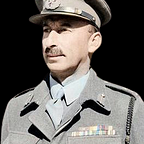The Furtive Cynosure
It is the year 1953, as available research goes, done deep but by only a handful of people.
It has been but six years since the independence of India. The literacy rate is below 20%, and debilitating poverty is the norm. English is the language of the elite; speaking it is an aspiration. Indeed, if in the average neighbourhood of vernacular glory, there should reside someone ungregarious, but if word should spread that he spoke excellent English, he would be the object of curious eyes ever interested in him.
The best source of local intelligence in any area is perhaps the beat constable assigned to it. If word of recent migration of a man of such erudition to his area should reach the beat constable, he would do well to make discreet inquiries into the matter. And it might even interest the police inspector sufficiently to raid such a man’s residence.
The town of Basti in Uttar Pradesh is a remote area even today; an era of far greater connectivity than ever before. Conceivably, it must have been a back of the beyond area in the 1950s and 60s. Amid this scene of national penury and uneducation, a reclusive man makes Basti his principal residence, living as a tenant. His furtive habits always interest the neighbours. The man would never show his face; nor would he talk to anyone voluntarily other than the landlords. If at all a visitor should drop by, he would meet them donning a monkey cap. He would mostly restrict himself to one room. Any movement outside would, as a rule, occur at night.
But rare indeed are cloaks of impregnable secrecy; something of his character would invariably be revealed. Some might overhear him and be awed by his stentorian voice. Some might accidentally behold his face and be left with a gnawing feeling that the features were familiar. Some would notice that the reclusive man spoke rich Bengali, as though having hailed from the cultured city of Calcutta. And the fortunate ear might come across the man speaking perfect English. Word would invariably spread. Some would speculate as to the antecedents of the man. Perhaps he is a retired official of the coveted Indian Civil Service (ICS)? But the trait most commonly known to others would be his stentorious chanting of Sanskrit hymns, having seemingly turned to a life of religion.
Witnesses would later report that, in the dead of the night, government cars would quietly roll up to his residence, and depart with equal peace before first light. Among these visitors would be ranked someone of such high office as the Chief Minister of Uttar Pradesh…..
So soon as the man, ever alert and discerning, suspected that some uncomfortable deductions as to his identity could be imminent, he would shift residence.
Soon enough, most who wished to hear him speak would refer to him as ‘Parde Wale Baba’ — the godman behind the curtain. For they were constrained to wait outside his room, either the entrance to which or the window of which would be draped, and from behind the shroud of which his voice would issue.
A close-knit circle of followers would be built over the years, among which were revolutionaries of erstwhile fame. Their fame, with the passage of time, subsided nearly into oblivion. But a rare follower or two would have the distinction of enjoying his confidence despite never having been close to the man during his public life; and such followers would be astounded at the width of the man’s knowledge. It became transparent to them that the ‘holy man’ was a mere facade, or at least, merely one aspect of a personality of plural shades — the man would make insightful comments on matters military, diplomatic, political, and even scientific.
Perhaps the most interesting aspect of the man was the kind of books he read. A few examples follow:
- Novels by Charles Dickens.
- Some issues of TIME Magazine.
- Novels by P.G. Wodehouse.
- The Dissenting Judgment by Justice Radhabinod Pal at the International Military Tribunal for The Far East.
- Volumes of The Story of Civilization by Will and Ariel Durant.
- Volumes of The Encyclopædia Britannica.
The town of Faizabad was his last residence. He would pass away on 16 September 1985. One of his followers, a local politician, would astound the public by disclosing the departed man’s identity. Inquiries followed suit, and among his possessions were found paraphernalia that should have ordinarily belonged to India’s long-lost and perhaps the greatest freedom fighter, Subhas Chandra Bose.
